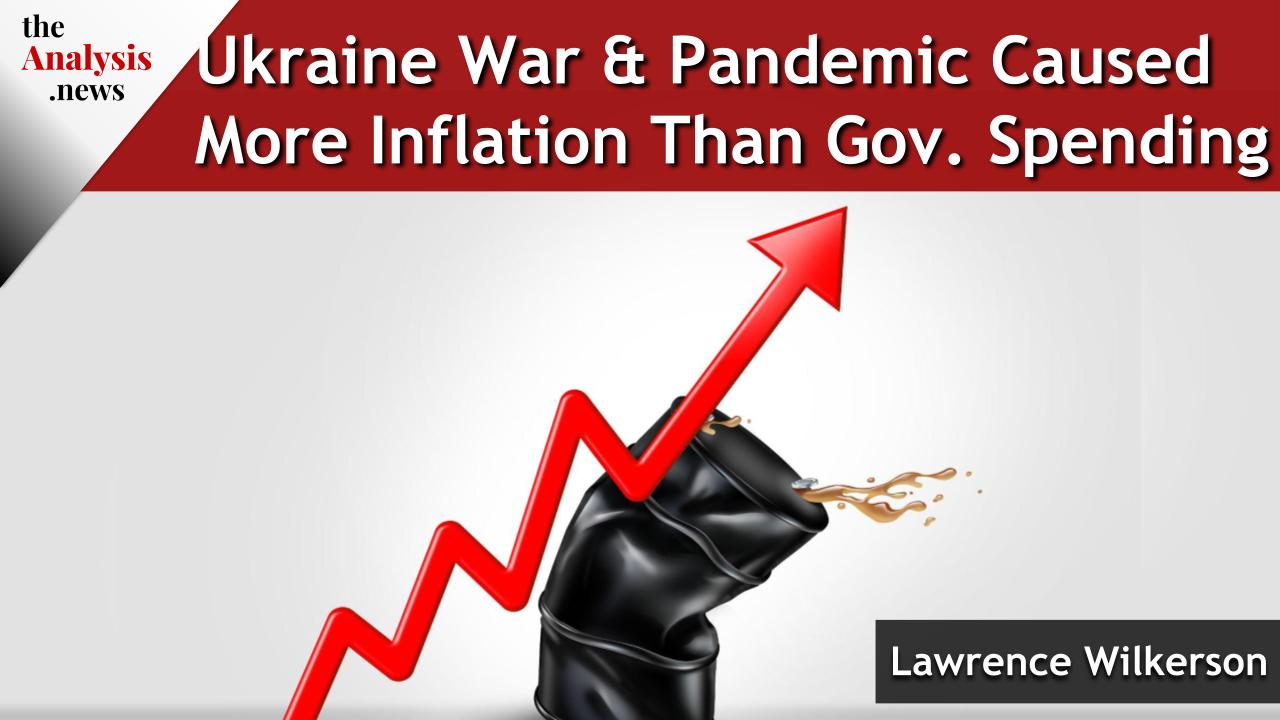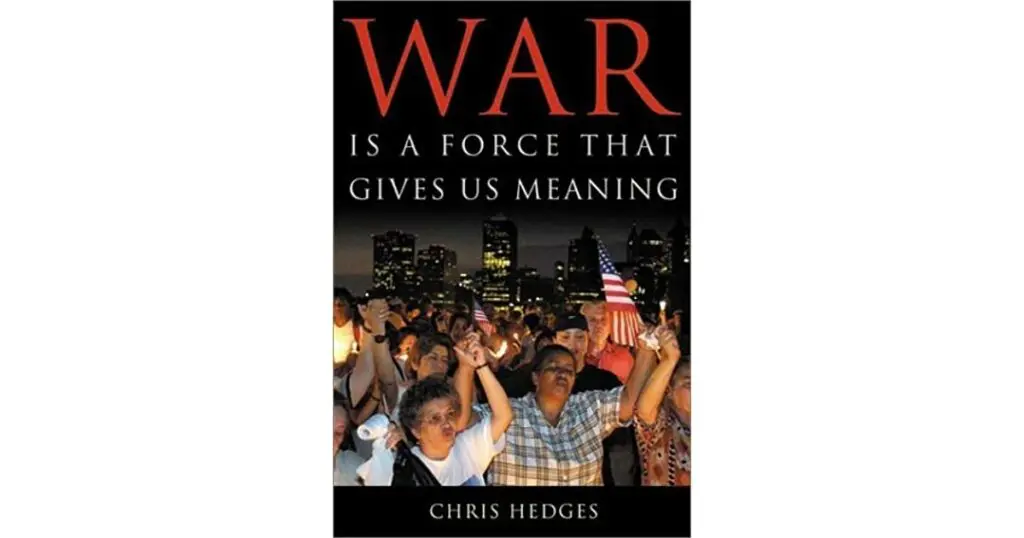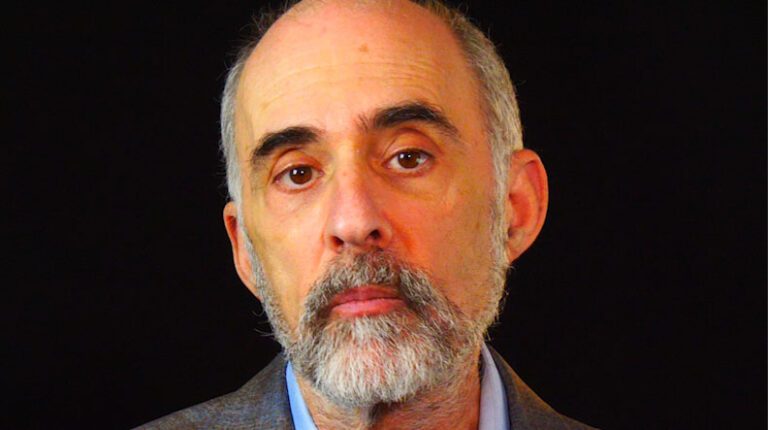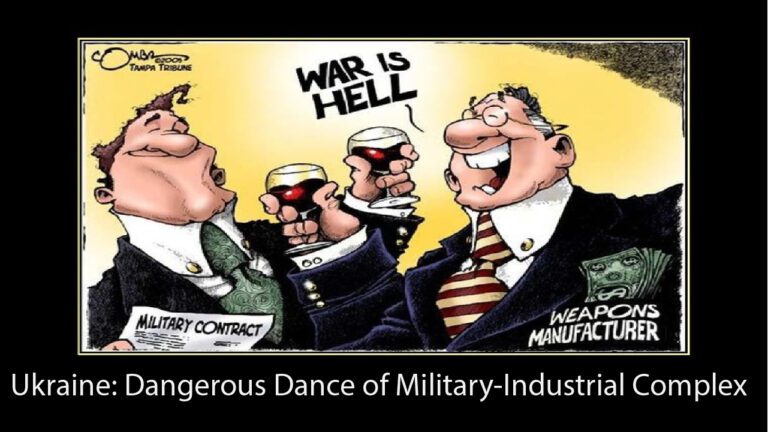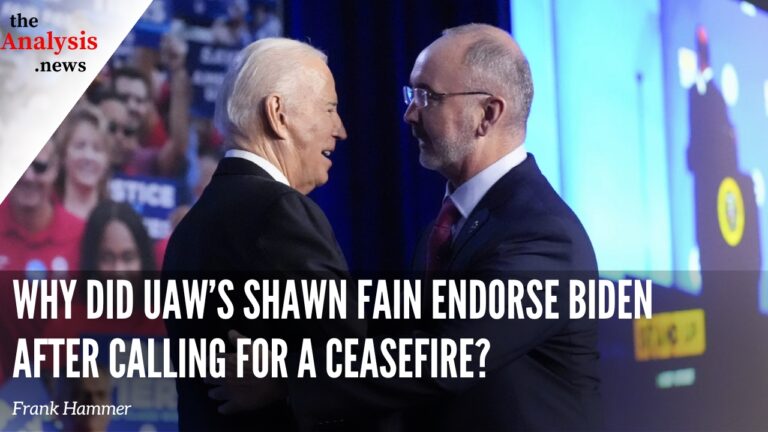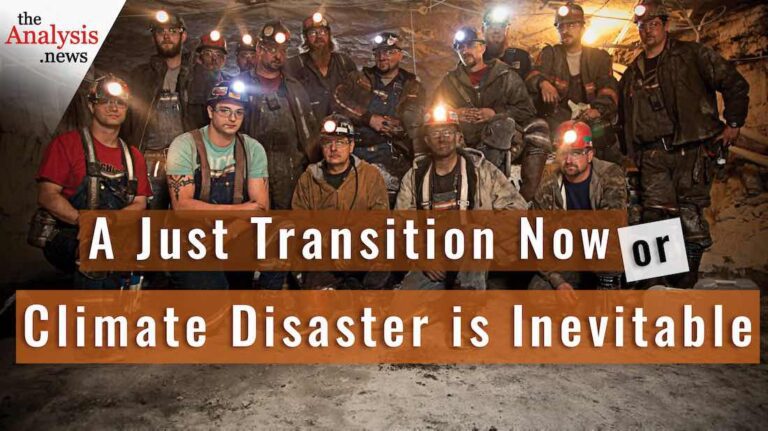Larry Wilkerson and Paul Jay discuss the results of the U.S. midterm elections, the reluctance of Democrats to defend stimulus spending, and the need for negotiations to end the war in Ukraine.
Paul Jay
Hi. Welcome to theAnalysis.news. I’m Paul Jay. In just a few seconds, I’ll be back with Larry Wilkerson, and we’re going to talk about the results of the U.S. midterm elections. Please don’t forget there’s a donate button. We’re heading towards the end of the year when a lot of people are thinking about donating. We are a 501(c)(3) in the United States. We’re not in Canada or other places, but I hope you donate anyway. The best way to donate is to come to the website. If you’re not already watching on the website at theAnalysis.news, click the donate button, and off you go. Also, please subscribe to the email list. Be back in just a few seconds with Larry Wilkerson.
On Tuesday, the midterm elections were almost over. The so-called ‘red wave’ didn’t happen, as everyone has commented on, and the Democratic Party got a reprieve from total disaster. Although it looks like they will lose control of the House, they’re not the only ones that got a reprieve. I guess you can say all of us got a reprieve because at least the far-right Christian nationalists, fascists, and batshit crazy forces didn’t take total control of Congress, and they lost some important governorships and just didn’t do as well as expected. Although they still control many state legislatures and governors, and, as I say, will probably wind up in control of the House.
I say a reprieve because if economists are correct and many are predicting, including many senior figures on Wall Street are predicting, we are heading into a recession. If the current economic policies are not changed, and we do head into a recession, then look out for the presidential elections and, of course, congressional, again, the House elections and such in 2024. If they take place in the midst of a recession, then, of course, the economy will be the only story. Unless, of course, we’re in the midst of some kind of nuclear war, but then it won’t matter.
All of that said, I have a little more to say about all this, but before I do, I’d like to introduce our guest, Col. Larry Wilkerson. Lawrence Wilkerson was the Chief of Staff to Secretary of State Colin Powell. He’s a regular on theAnalysis.news, and so I don’t think he needs a heck of a lot more of an introduction. Thanks very much, Larry, for joining us again.
Lawrence Wilkerson
Good to be with you.
Paul Jay
The American people who voted expressed more rationality than was expected.
Lawrence Wilkerson
I think that’s clearly the case.
Paul Jay
I’d say it’s a temporary reprieve, but what do you make of why there wasn’t the traditional swing to the party not in power, not in the White House?
Lawrence Wilkerson
The three people that I’ve read today while I was watching, listening to the National Symphony Orchestra play [Claude] Debussy, [Richard] Wagner, and others, looking at my phone surreptitiously, they said abortion was the biggest issue, parsing it state-by-state. They said abortion was the biggest issue, therefore, the Democrats made an error. They should have pushed that issue, pushed that issue, pushed that issue right up to the last minute. Now, of course, that might have backfired had they pushed it so hard, but that was in most states where they’ve done some reasonable polling– why did you vote this way afterward? It’s abortion, and women were the big turnout factor, as you might imagine. That was the number one.
The other issue is parsed out over the states, whatever the state happened to be, whether it was Wisconsin, Michigan, or Pennsylvania. Pennsylvania, one political scientist said, “well when you have a nut running, the other guy has a pretty good chance.” I assume he was talking about the governor’s race. There were different issues across the country regarding the second, but abortion was the top one. That’s what they all said anyway in their reports.
Paul Jay
I thought the fact that over and over again in the media, without almost any pushback, the odd one, but almost none, the fact that the economy was equated as a strength for the Republican Party and that inflation as an issue somehow favored the Republicans. I thought the fact that the Democrats, except for a few exceptions and a few media pundits, mostly didn’t push back on that. They kind of accepted the fact that the economy was a strength for the Republicans, so they had to fight on the issue of democracy and abortion.
I looked at a very interesting study for the Democrats; as much as I can’t stand the corporate Democrats, for them to acknowledge and accept in a way that the bailout packages were fundamentally responsible for inflation, which is what was said over and over again by Republicans. I saw Chris Christie on the Stephanopoulos show Sunday morning. Donna Brazile was opposite him, and he said, “well, we’re going to win because of inflation in the economy, and everybody blames the inflation on the Democrats, and they deserve to be blamed,” and she doesn’t push back on that.
Sarah Isgur
“Inflation has raised the minimum wage because now you have to pay $20 to the grocery store.”
Donna Brazile
“What drives inflation? It’s not just who is in Washington, DC. This inflation is being driven by huge demand at a time we had two years of economic lockdown.” [crosstalk 00:05:59]
Chris Christie
“I’ll take Larry Summer’s word for it, okay. Larry Summers, Clinton’s Treasury Secretary, told the Biden administration two years ago, “you go ahead with the spending you’re talking about, and you are going to create enormous inflation.” It’s exactly what happened. We can try to blame it on a whole bunch of other things, but when you put $5 trillion that you printed into the economy, after all the money that we put in during COVID, that’s why you have inflation. The fact is that it’s got to stop at some point, and the Democrats don’t want to talk about that because their constituencies are all about ‘pay me more’.”
“In the end, Sarah’s right that they ceded that this round to Republicans because they knew that Joe Biden couldn’t articulate the argument as to why he was better.”
Paul Jay
There was an interesting study done by the San Francisco Federal Reserve. In fact, two studies where they analyzed the big bailout packages during the Biden administration, stimulus packages that put a lot of money in people’s pockets. The maximum inflationary power of those subsidies maybe adds 3% to inflation. Now, this is at a time when this all began, when inflation was practically zero anyway. The actual stimulus packages might have given a 3% inflation rate which is actually not so terrible. It means that– it’s relatively healthy to have inflation down around three, maybe 2%. The 8%, and maybe more inflation, comes from the Russian invasion of Ukraine, the increased energy prices, supply chain problems, semiconductor problems, and on and on with the global supply chain. The vast majority of the increased inflation had absolutely nothing to do with government spending.
Then number two, because of the effect of those government stimulus plans that put money in people’s pockets, it is pretty much gone because that stimulus money is not flowing anymore. The current inflation rate has next to nothing to do with government spending. It might have a minor piece, but very minor.
Lawrence Wilkerson
Well, but why would you doubt for a moment that the media– the Republicans read the media better than the Democrats– wasn’t going to support the idea of inflation being Biden’s fault? They’re not going to point out what really is causing the problem, and that is the damn war in Ukraine and those things associated with it, and Covid, as you pointed out. I dare say the war in Ukraine, the supply side problems it’s created, and the chain problems it’s created in everything from fertilizer to food is causing more of this than anybody else wants to say, including the government, because they’d never do anything in reporting inflation except ambiguity and lies. They pull things out and say, “oh, this is food, and this is gas,” and they pull another thing out and say, “oh, this is houses.” It’s crazy. If you looked at the whole inflation business, you’d probably find that Ukraine is the number one cause. The war in Ukraine.
Paul Jay
I agree with that to a large extent, but let me add another point. This report from the San Francisco Fed said not only was inflation at a maximum of maybe 3% because of government spending, but if there hadn’t been that government spending, if there hadn’t been the stimulus, it says there would have been deep recession which would have been far more difficult to deal with than a temporary 3% of inflation.
Lawrence Wilkerson
Probably true.
Paul Jay
Now, the other big piece of inflation, which I agree with you. The war in Ukraine is a major part and the Russian invasion and such, but also the rising tension with China, the threat, and the fear amongst the corporate elites– and it’s a legitimate fear, although it’s to a large extent stoked by the American government– that China may not be a reliable producer for American products anymore. They fear that about the global supply chain. All of this adds up to the fundamental fear they have, which is the thing that terrifies corporate America, including corporate America that backs the Democratic Party. The American working class, for the first time in decades, actually has some leverage. There are a lot of jobs not filled out there. Wages are actually going up some. There’s some rising militancy in the American working class. Nothing scares American corporate elites more than the American workers actually starting to wake up. Maybe there’s even some reflection of that in these elections.
I think the Democratic Party, corporate leadership, at least, didn’t really want to unpack how benign the government spending was because corporate America now wants austerity, they want high-interest rates, and they want to beat back any feeling amongst American workers that they actually have some strength and might unionize, and might go on strike which many are doing.
Lawrence Wilkerson
I think the media really astonishes me with this war in Ukraine in how they played it to the maximum extent possible on our side, on the west side, and so forth. I think the money that’s being spent on that and the money that’s being spent in anticipation of [Volodymyr] Zelenskyy not giving up, the money that’s being spent on NATO, in general, is money that’s going down a toilet. Pretty soon, that’s going to have an even more dramatic effect on our financial situation, our economic situation, and the world’s economic situation than other things because it’s doing things that are not healthy for the future of Europe’s economy or our economy.
Take Germany, for example, where there is a real discussion going on about its manufacturing leaving Germany because of the situation facing them in terms of energy. Nord Stream didn’t do any good to that. Nord Stream probably made a lot of corporate leaders in Germany decide that their energy future was so tenuous that they are going to relocate. I’m told they’re out there scouting right now. They’re probably not going to move to China, but they might move some aspects of their manufacturing to China. Most people don’t realize that Germany is one of the few manufacturing countries left in the world. It’s actually, 20% to 21% of its economy is manufacturing, whereas France is about 7%, and the U.S. is about 9%. We just aren’t manufacturing countries anymore in the West.
Now, a 9% portion of the U.S. GDP devoted to manufacturing is bigger than most other countries in the world manufacturing because we’re so gigantic in terms of our base. It does indicate how much our GDP and how much our production has turned into– I hesitate to use the word production– moving money around. Whether it’s the bank of International Settlements or it’s the New York Fed, which works with the BIS, or it’s some of these other crazy things that we do today with money that really fuels the coffers of the .001%, not just in the U.S. but in the world, but in the U.S. first. That’s the thing where our hegemony really matters. That’s what we do.
When you take a country like Germany, which still is a good, solid manufacturing country, and you start doing this sort of thing to it, then you’re disrupting the whole pattern of postwar Europe. I don’t think that’s good. I really don’t. I’m all for both Germany and Japan being treated not as World War Two pariahs but as first-class, decent democratic states today. There is an impetus to give them problems that I would not rather give them, like Japan having to decide whether it’s going to go nuclear or not in the face of this incredibly stupid, maniacal re-emphasis of nuclear weapons. That would be, I think, very dangerous if Japan went full-up nuclear.
On the other hand, if we drove Germany into some kind of isolation in Europe and made her feel like she had to fall back on her own recognizance all the time, and she started doing things that weren’t necessarily healthy for the rest of Europe. We don’t have to consult history too closely to figure out that this is the sort of thing that happens. It’s not anything in the character of the Japanese or the character of the Germans. It’s what their geography and the rest of the world force them into because of their geography and because of the rest of the world’s attitude towards that country and even connivance in making that country what it shouldn’t be.
A great case in point is when Helmut Kohl said, “do you really want, after we unified Germany, it to be a member of NATO, or do you want it to be neutral” Everybody said, “of course, we want it to be a member of NATO. We want it to be the most powerful European member of NATO.” Okay, think about that for a minute. Just think about history, think about geography, think about Moscow, and think about that for a minute before you so– I mean, this is a German saying that. Yet we went ahead and did what we did, and then we amplified the problem tenfold, 100-fold, by saying, “bye, Germany. We’re going to go that way. We’re going to go past you. We’re going to go to Poland. We’re going to go to Hungary. We’re going to go to Finland, Norway, and other countries, finally.”
We’ve made NATO such an untenable organization now that I’m more worried about our attempt to reestablish our ultimate hegemony over Europe through NATO than I am about the economic situation, and that takes a lot to make me worry more about that than the economy.
Paul Jay
They’re very tied together because, as I said, the war in Ukraine is what drove– go back. I don’t want to say the war in Ukraine because it sounds like it’s some abstraction. The Russian invasion, the illegal Russian and brutal invasion of Ukraine, without doubt, provoked, but still, it was Russia’s choice to do it; that said, it drove energy prices up, which is the biggest factor that drove inflation up.
Up until now, I think domestic politics in Russia and domestic politics in the United States were driving this policy more than anybody’s security concerns. Of course, Ukraine had legitimate security concerns. They just got invaded.
Now that the midterms are over, are we seeing a little hair of rationality in the Biden administration on Ukraine and even on China? I read a report yesterday that under American pressure, Zelenskyy withdrew his statement that he would refuse to negotiate with Russia until Putin was gone. Well, that’s something.
Lawrence Wilkerson
That is something big.
Paul Jay
I saw that Biden’s going to meet with Xi [Jinping] in the next few weeks. That’s something. It sounds like there’s going to be maybe a rational conversation between the U.S. and China. I’m wondering if there’s some domestic political pressure off Biden now that he can–
Lawrence Wilkerson
I hope so.
Paul Jay
— be so one-sided.
Lawrence Wilkerson
I said that a couple of weeks ago. I said, “I want to see what Biden does, win or lose, in the midterms, what he does when the political pressure is off him, and he can show some ankle on Ukraine. Will he then turn to diplomacy?” I know Joe Biden knows diplomacy is the only answer to this conflict. I also know that he knew I’m 40% in the polls and sinking further, and the midterms are coming up, and we’re going to get blasted if I suddenly say, “I’m going to Geneva and sit down with Putin.” That would have been– the media would have just ripped him apart, almost the way they ripped [George] Marshall apart when he came home from China and lost China. We do those sorts of things. So it was inevitable. I know Biden knew that. I’m hoping, as you said, on both counts, China and Ukraine, Moscow, he sees an opportunity to do some things afterward. Not that he was mightily empowered by the midterms, but he certainly wasn’t disemboweled.
It might have been more emphatic, though, if he were disempowered significantly. If they really lost badly, then he would have thought, “well, I can go out and at least have a foreign policy triumph. Or I can do something that defies the media and the people and turn it into a positive,” like [Richard] Nixon did when he went to China, for example. Got nothing to lose, in other words. Well, you can say now he’s got a little more to lose, but I think it’s still time, and I think he’ll realize that. I hope he puts [Antony] Blinken in a straitjacket because Blinken has shown me that he doesn’t know how to be a diplomat. He has no clue about what it takes to be a diplomat.
Paul Jay
My most optimistic hope– and what’s the word– optimistic hope, low expectation is that Biden will realize that if they want to win in 2024, they have to stop a deep recession from setting in and do everything they can. If the Republicans control the House, they’re not going to be able to pass, probably any more stimulus unless somehow he can do something by executive order.
His one way of doing this is to get a deal in Ukraine, let energy prices get back to where they were, and give up any notion of bringing down Putin’s government. Again, be careful what you wish for because from what I know of Russian domestic politics, which is very little, but from what I’m told from people who do, you’re as likely to get someone more militarist, more fascistic than Putin. There’s no reason to think if Putin falls, you’re going to get some pro-Western figure in there. Not that being pro-Western is so great, either. That said, be careful what you wish for if this is the fall of Putin. If they can get energy prices back down to pre-war levels, I would think that would go a long way to at least making this recession minor and maybe no recession at all. Maybe this election gives Biden the wherewithal to do that because nothing is going to help him more in the elections than getting energy prices down.
Lawrence Wilkerson
I think you’re right, and I think it’s going to be a harder row than maybe you think to hoe because I think the Saudis, OPEC plus, and OPEC itself are going to be really pegged on that price per barrel that they’ve been pretty much fixed at. As a number of people have pointed out lately, not trying to defend the Saudis but trying to show the rationale, it’s a very logical rationale for why they’re at where they are right now and don’t want to go too much lower, nor go too terribly or much higher. It’s the old ballgame of don’t want to incentivize too fast renewable energy sources, and we have to have what we’re getting at the bottom of our price range in order to fulfill MBS’s plan. They can’t go below that for more than a month or so, or their plan just gets tubed. The Saudis are very logical about this. It has nothing to do, I don’t think, with their angst over [inaudible 00:22:18] and our emphasis on it or the Yemen war or whatever. That’s not the way the Saudis deal. They’re purely pragmatic. Even MBS is made to be pragmatic by the plans he has for the future, which are going to cost a certain amount of money, which in real life, he is heavily indebted for already. I don’t just mean monetary debt. If he doesn’t keep that range, then it’s curtains for him, I would estimate, and a lot of people like me who are more expert than I estimate the same thing.
Trying to get that price down anywhere below that bottom figure the Saudis are looking at in their scale is probably going to be difficult because I suspect that if Putin’s still around or whatever Russian leader is still around, they’ll agree with that, and they’ll stay at that. That’s all about geopolitical developments between Moscow and Riyadh, and Beijing and Riyadh, and to a certain extent–
Paul Jay
China’s interest is to get energy prices down, too. They don’t–
Lawrence Wilkerson
Yeah, but not as long as they’re getting it at a cut-rate price from Russia. That’s kind of what they’re doing in order to not say too much adverse about Ukraine.
Paul Jay
Well, I agree with you. I’m no expert on oil prices either, but oil prices were down significantly lower than they are now prior to–
Lawrence Wilkerson
I don’t know what the bottom is now. The bottom was about–
Paul Jay
I was just going to say if you are heading into a– sorry, go ahead.
Lawrence Wilkerson
No, the bottom of the range was about $55 to $56 a barrel, but that was when we were doing the exercises in Beijing at the end of the first decade of this century. I don’t know what it is now. I suspect it’s probably around $88-$89 or somewhere in that neighborhood. He was saying the other day that it’s $125-$130. I don’t think it’s that high. That might be the top part that doesn’t incentivize faster development of alternative energy and therefore leaves them with trillions of dollars of stranded assets because it will be in the ground, and they haven’t got money out of it when we transition.
Paul Jay
Well, are you seeing some of the signs that maybe Biden is more open now–
Lawrence Wilkerson
Yes.
Paul Jay
–to push the Ukrainians to negotiate a deal?
Lawrence Wilkerson
I think it’s just inevitable from the politics of it. It’s hard because the media has made such a cause celeb of this war. They’ve made it such a white Christian nationalist, blah, blah, blah. This is the war. This is the war we want to be in. This is World War II revisited. They will probably fall off of that rapidly after the winter, but right now, that’s what it is. He’s still got to fight that.
What’s the media going to say? What’s going to be the headline above the New York Times, Washington Post, when he decides to do diplomacy? Is it going to be favorable? Is it going to be neutral? Is it going to be favorable? Are they going to be encouraging? What are they going to write, and what’s the editorial page of the Wall Street Journal going to write? That’s a republican–
Paul Jay
My feeling is there is a mood-building for negotiations.
Lawrence Wilkerson
I hope so. I hope so.
Paul Jay
Zelensky– I can’t imagine how they’re not going to have to give up on Crimea because if they push that–
Lawrence Wilkerson
Well, he said today, or I read today, I think, in the New York Times, a quote of him where he said, “we took…” what’s the city they just got back? It just went out of my head. Kherson? “If we did that, we can take Crimea back.” Oh, okay.
Paul Jay
That Russians cannot live with that.
Lawrence Wilkerson
No, I don’t think so.
Paul Jay
The thing about this– and I want to keep saying this because a lot of these geopolitical conversations don’t talk about this– the issue is tens of thousands of people are dying. I heard today [Mark] Milley thinks 100,000 Russian soldiers have died. They think more than 100,000 Ukrainian soldiers have died. Tens of thousands and thousands, I don’t know what the number is now, of Ukrainian civilians have died. This has to stop for those reasons and this distraction of having to defend every inch of Ukrainian sovereignty–
Lawrence Wilkerson
Well, it’s always the people who don’t have to stand there with a bayonet and man the foxhole or the tank or the artillery piece who are saying that. It’s rarely the personnel on the frontline unless the personnel on the front lines are propagandists.
Paul Jay
Thanks very much for joining me, Larry.
Lawrence Wilkerson
Thanks for having me, Paul.
Paul Jay
Thanks for joining us on theAnalysis.news. Please don’t forget the donate button at the top of the website.
Paul Jay
Hola. Bienvenido a theAnalysis.news. Soy Paul Jay.
En unos segundos volveré con Larry Wilkerson y vamos a hablar de los resultados de las elecciones a medio mandato en Estados Unidos.
Por favor, no olvide que hay un botón de donar. Nos acercamos al final del año y mucha gente está pensando en donar. Somos un 501 en los Estados Unidos. No en Canadá ni en otros lugares, pero espero que done de todos modos. Y la mejor manera de donar es ir al sitio web, si no está ya en el sitio web theAnalysis.news, haga clic en el botón de donar y listo. Y también registre su correo electrónico.
Vuelvo en unos segundos con Larry Wilkerson.
El martes, las elecciones a medio mandato casi habían concluido. La llamada ola roja no sucedió, como todos han comentado, y el Partido Demócrata se salvó del desastre total. Aunque parece que perderán el control del Congreso.
No son los únicos que se salvaron. Supongo que se puede decir que todos nos salvamos en cierto modo. Porque al menos los nacionalistas cristianos de extrema derecha, los fascistas y las fuerzas completamente desquiciadas no tomaron el control total del Congreso y perdieron algunas gobernaciones importantes, y no les fue tan bien como se esperaba, aunque todavía controlan muchas legislaturas estatales y gobernadores y, como digo, probablemente terminarán con el control de la Cámara.
Digo que nos salvamos porque si los economistas aciertan, y muchos, incluyendo muchas figuras de alto nivel en Wall Street, predicen que nos dirigimos a una recesión, y si no se cambian las políticas económicas actuales y nos dirigimos a una recesión, hay peligro en las elecciones presidenciales y por supuesto, nuevamente en el Congreso, las elecciones a la Cámara y demás, en 2024, porque si tienen lugar en medio de una recesión, por supuesto, la economía será la única historia. A menos, por supuesto, que estemos en medio de algún tipo de guerra nuclear, pero entonces no importará.
Así que dicho todo eso… Tengo más que decir sobre todo esto, pero antes de hacerlo, me gustaría presentarles a nuestro invitado, el coronel Larry Wilkerson, Lawrence Wilkerson, fue jefe de Estado Mayor para el secretario de Estado Colin Powell, y es un habitual en theAnalysis.news, así que no creo que necesite mucha más presentación.
Muchas gracias, Larry, por acompañarnos nuevamente.
Larry Wilkerson
Es un placer estar contigo.
Paul Jay
Entonces, el pueblo estadounidense que votó expresó más racionalidad de lo que se esperaba.
Larry Wilkerson
Creo que eso es claramente…
Paul Jay
Diría que es una especie de respiro temporal, pero ¿qué opinas de por qué no se produjo el giro tradicional hacia el partido que no está en el poder, en la Casa Blanca?
Larry Wilkerson
Las tres personas que he leído hoy mientras escuchaba a la Orquesta Sinfónica Nacional interpretar a Debussy y Wagner y otros mirando mi teléfono a escondidas dijeron que el aborto ha sido lo más importante al analizarlo estado por estado. Por lo tanto, los demócratas cometieron un error. Deberían haber machacado ese tema incesantemente hasta el último minuto. Podría haber sido contraproducente si se hubieran excedido, pero fue así en la mayoría de los estados en los que han hecho algunas encuestas razonables, por qué votaron así. Es el aborto, y las mujeres fueron el gran factor de participación, como te puedes imaginar. Así que ese fue el número uno.
El otro tema es una especie de análisis sobre los estados, cualquiera que sea el estado, ya fuera Wisconsin o Míchigan o Pensilvania o… Sobre Pensilvania, un politólogo dijo: “Bueno, cuando tienes a un candidato chalado, el otro tipo tiene muchas posibilidades”. Imagino que estaba hablando del gobernador. El segundo puesto lo ocuparon diferentes temas en todo el país, pero el aborto ha sido el primero. Eso es lo que todos dijeron en sus informes.
Paul Jay
Pensé que el hecho de que una y otra vez en los medios, sin casi ninguna oposición… Algo, pero no mucha. El hecho de que la economía fue calificada como una fortaleza para el Partido Republicano y que la inflación como tema electoral de alguna manera favorecía a los republicanos… Y pensé… Los demócratas, salvo algunas excepciones y algunos analistas de los medios, en su mayoría no formularon una respuesta. De alguna manera aceptaron el hecho de que la economía era una fortaleza para los republicanos, así que debían pelear por el tema de la democracia y el aborto.
Pero vi un estudio muy interesante para los demócratas, aunque no soporto a los demócratas corporativos, para que reconozcan, acepten, de alguna manera, que los paquetes de rescate fueron fundamentalmente responsables de la inflación, que es lo que decían una y otra vez los republicanos… Vi a Chris Christie en el programa de Stephanopoulos el domingo por la mañana, Donna Brazile estaba frente a él, y dijo: “Bueno, vamos a ganar por la inflación que hay en la economía, y todo el mundo culpa de la inflación a los demócratas, y lo merecen”, y ella no responde a esto.
Aumentar el salario mínimo. Ahora tienes que pagar 20 dólares a la tienda de comestibles. ¿Qué impulsa la inflación? No se trata solo de quién está en Washington, DC. Esta inflación está siendo impulsada por una gran demanda. En ese momento, teníamos dos años de [inaudible]. Confío en la palabra de Larry Summer. ¿De acuerdo? Larry Summers, secretario del Tesoro de Clinton, le dijo a la administración de Biden hace dos años: “Si implementan el gasto del que están hablando, van a crear una inflación enorme”. Y es exactamente lo que pasó. Y podemos echarle la culpa a otras cosas, pero cuando pones 5 billones de dólares que imprimiste en la economía, después de todo el dinero que inyectamos durante el covid, es por eso que tienes inflación. Y el hecho es que tiene que parar en algún momento, y los demócratas no quieren hablar de eso porque son consecuentes. Se trata de pagar más al final. Sara tiene razón. Que vean que esto [inaudible] los republicanos porque sabían que Joe Biden no podía articular el argumento de por qué era mejor.
Paul Jay
Fue un estudio interesante realizado por la Reserva Federal de San Francisco, de hecho, dos estudios, donde analizaron los grandes paquetes de rescate durante la administración Biden, paquetes de estímulo, que ponen mucho dinero en los bolsillos de la gente. El máximo poder inflacionario de esos subsidios quizá agregó un 3 % a la inflación. Esto es en un momento, cuando todo esto comienza, en que la inflación era prácticamente cero de todos modos, por lo que los paquetes de estímulo reales podrían haber dado una tasa de inflación del 3 %, que en realidad no es tan terrible. Significa que… Es relativamente saludable que la inflación esté alrededor del 3, tal vez un 2 %.
El 8 %, y quizá más, de inflación proviene de la invasión rusa de Ucrania, el aumento de los precios de la energía, la cadena de suministro, problemas de semiconductores y con la cadena de suministro global. Así que la gran mayoría del aumento de la inflación no tenía absolutamente nada que ver con el gasto público.
Y luego, el número dos, porque el efecto de esos planes gubernamentales de estímulo de poner dinero en los bolsillos de la gente prácticamente ha desaparecido, porque ese dinero de estímulo ya no fluye. Entonces, la tasa de inflación actual no tiene casi nada que ver con el gasto público. Puede ser una pequeña parte, pero muy pequeña.
Larry Wilkerson
Bueno. Pero ¿por qué dudarías por un momento de que los medios, y los republicanos leen los medios mejor que los demócratas, no iban a apoyar la idea de que la inflación es culpa de Biden? Porque no van a señalar lo que realmente está causando el problema, y eso es la maldita guerra en Ucrania y cosas relacionadas con ella. Y covid, como bien apuntaste. Pero me atrevo a decir que la guerra en Ucrania y los problemas de la oferta de mercado y cadena de suministros que crea, y todo, desde fertilizantes hasta alimentos, está causando más de esto de lo que nadie quiere admitir, incluido el Gobierno, porque nunca dicen nada al informar de la inflación excepto ambigüedad y mentiras. Mencionan algo y dicen: “Oh, esto es comida y esto es gas”, y mencionan otra cosa y dicen: “Ah, esto son casas”. Es una locura. Si observas la inflación, probablemente encontrarás que Ucrania es la causa número uno. La guerra en Ucrania.
Paul Jay
Estoy de acuerdo con eso en gran medida. Pero permíteme agregar otro punto.
Este informe de la Reserva Federal de San Francisco dice que no solo la inflación debida al gasto público fue como máximo de un 3 %; sin ese gasto público, sin ese estímulo, dice que habría habido una profunda recesión, que habría sido mucho más difícil de manejar que un 3 % temporal de inflación.
Larry Wilkerson
Probablemente.
Paul Jay
Otra importante causa de inflación, y estoy de acuerdo contigo, la guerra en Ucrania es una parte importante, la invasión rusa y demás, pero también la creciente tensión con China, la amenaza, el miedo entre las élites corporativas, y es un miedo legítimo, aunque en gran medida lo fomenta el Gobierno estadounidense, de que China puede que ya no sea un productor fiable de productos estadounidenses. Y temen por la cadena de suministro global.
Y todo esto se suma al miedo fundamental que tienen, que es lo que aterra a la América corporativa, incluida la que respalda al Partido Demócrata, que es la clase obrera, que, por primera vez en décadas, tiene verdaderamente cierto poder. Hay mucha oferta de trabajo. De hecho, los salarios están subiendo un poco. Hay sindicalismo creciente en la clase obrera estadounidense. Y nada asusta a las élites corporativas estadounidenses más que ver que los trabajadores estadounidenses comiencen a despertar. Quizá incluso haya algún reflejo de eso en estas elecciones.
Así que creo que el Partido Demócrata, los líderes corporativos al menos, realmente no querían analizar lo paliativo que fue el gasto público porque las empresas estadounidenses ahora quieren austeridad, quieren altas tasas de interés y quieren aplastar cualquier sentimiento entre los trabajadores estadounidenses de que tienen algo de poder y podrían sindicalizarse, podrían ir a la huelga, que muchos están haciendo.
Larry Wilkerson
Los medios realmente me asombran con esta guerra en Ucrania y cómo la presentaron en todo momento desde nuestro lado, de Occidente, y todo eso. Y creo que el dinero que se gasta en eso y el dinero que se gasta dando por sentado que Zelensky no se rendirá, el dinero que se gasta en la OTAN en general, es dinero que se va por un retrete.
Y muy pronto eso va a tener un efecto aún más dramático en nuestra situación financiera, nuestra situación económica, la situación económica mundial, que otras cosas, porque es hacer cosas que no son saludables para el futuro de la economía europea o de nuestra economía.
En Alemania, por ejemplo, se está planteando que su industria abandonará Alemania debido a la situación a la que se enfrentan en términos de energía. Nord Stream también contribuyó. Nord Stream probablemente hizo que muchos líderes corporativos en Alemania decidieran que su futuro energético era tan tenue que se van a trasladar. He oído que ahora mismo están buscando. Probablemente no se vayan a China, pero podrían trasladar algunos aspectos de su industria a China. Muchos no se dan cuenta de que Alemania es uno de los pocos países industriales que quedan. Entre el 20 % y el 21 % de su economía es manufacturera, mientras que Francia es alrededor del 7 %, y EE. UU. es de alrededor del 9 %. Occidente ya no es una zona industrial. Ahora, una porción del 9 % del PIB de EE. UU. dedicada a la industria es más grande que la mayoría de los demás países del mundo porque nuestra base es tan enorme, pero indica qué porcentaje de nuestro PIB y de nuestra producción, dudo en usar la palabra producción, en mover dinero, ya sea el BIS o la Reserva Federal de Nueva York, que trabaja con el BIS, o las otras locuras que hacemos hoy con el dinero, eso realmente alimenta las arcas del .001 %, no solo en los EE. UU., sino en el mundo, pero en los EE. UU. primero. Ahí es donde nuestra hegemonía realmente importa. Eso es lo que hacemos.
Y cuando consideras un país como Alemania, que aún es un país manufacturero sólido, y empiezas a hacerle este tipo de cosas, estás alterando todo el patrón de la Europa de la posguerra. Y no creo que eso sea bueno, realmente no lo creo. Estoy a favor de que Alemania y Japón no sean tratados como parias de la Segunda Guerra Mundial, sino como legítimos Estados democráticos de primera clase. Pero hay una tendencia a causarles problemas que yo preferiría no causarles, como que Japón tiene que decidir si va a tener la bomba atómica o no, porque estamos viendo una vuelta increíblemente estúpida e insensata a las armas nucleares. Sería, creo, muy peligroso si Japón tuviera la bomba atómica.
Y por otro lado, si llevamos a Alemania a una especie de aislamiento en Europa y la llevamos a pensar que tiene que actuar por sus propios medios todo el tiempo, puede empezar a hacer cosas quizá perjudiciales para el resto de Europa.
Con un vistazo a la historia nos daremos cuenta de que esto es lo que suele suceder. No tiene nada que ver con el carácter de los japoneses o de los alemanes. Los forzaron su geografía y el resto del mundo, su geografía y la actitud del resto del mundo hacia ese país, e incluso la connivencia para hacer de ese país algo que no debe ser.
Un gran ejemplo es cuando Helmut Kohl dijo: “¿De verdad quieren, después de que unificamos Alemania, que sea un miembro de la OTAN, o quieren que sea neutral?”. Y todos dijeron que la querían en la OTAN, que fuera el miembro europeo más poderoso de la OTAN. Está bien, piénsalo un minuto. Piensa en la historia, en la geografía, piensa en Moscú, y piensa en eso un minuto antes de que… Quiero decir, lo dijo un alemán, y sin embargo seguimos adelante e hicimos lo que hicimos, y luego amplificamos el problema diez veces, cien veces, diciendo: “Adiós, Alemania. Vamos a ir por ese camino. Vamos a ir más allá. Vamos a ir a Polonia, a Hungría, a Finlandia y Noruega y otros países después”.
Hemos hecho de la OTAN una organización tan insostenible ahora que estoy más preocupado por nuestro intento de restablecer nuestra total hegemonía sobre Europa a través de la OTAN que por la situación económica. Y eso dice mucho, que me preocupe más por eso que por la economía.
Paul Jay
Y están muy relacionadas porque, como he dicho, la guerra en Ucrania es lo que impulsó… De nuevo, no quiero decir “guerra en Ucrania” porque parece una abstracción. La invasión rusa ilegal y brutal de Ucrania, sin duda provocada, pero aun así la elección de Rusia de hacerlo, debe decirse, hizo subir los precios de la energía, que es el principal factor que impulsó la inflación. Y hasta ahora, creo que la política interna en Rusia y en los Estados Unidos estaba impulsando esta política más que las preocupaciones de seguridad de nadie. Por supuesto, Ucrania tenía preocupaciones de seguridad legítimas, los han invadido.
Pero ahora que las elecciones han terminado, ¿veremos un poco de racionalidad en la administración Biden sobre Ucrania e incluso sobre China? Ayer leí un informe de que bajo presión estadounidense, Zelensky retiró su declaración sobre que no negociaría con Rusia hasta que Putin se fuera. Bueno, eso es algo.
Larry Wilkerson
Eso es algo grande.
Paul Jay
Y vi que Biden se reunirá con Xi en las próximas semanas. Eso es algo. Y parece que va a haber quizá una conversación racional entre EE. UU. y China. Y me pregunto si hay alguna presión política interna sobre Biden…
Larry Wilkerson
Eso espero.
Paul Jay
…por lo que es tan unilateral.
Larry Wilkerson
Dije eso hace un par de semanas. Dije que quiero ver lo que hace Biden, gane o pierda en las elecciones. Cuando no tenga presión política y pueda ser más atrevido en Ucrania, ¿volverá entonces a la diplomacia? Porque Joe Biden sabe que la diplomacia es la única respuesta a este conflicto. Pero también sé que él pensaba: “Tengo el 40 % en las encuestas y bajando, y se acerca el medio mandato, y vamos a ser criticados si de repente digo que voy a Ginebra a hablar con Putin'”.
Los medios simplemente lo habrían destrozado, casi en la forma en que destrozaron a Marshall cuando volvió de China y había perdido China. Hacemos ese tipo de cosas, así que era inevitable. Y sé que Biden lo sabía. Así que espero que, como has dicho, en ambos aspectos, China y Ucrania, Moscú, vea la oportunidad de hacer algunas cosas después.
No es que le dieran mucho poder las elecciones de medio mandato, pero ciertamente no lo han destripado. Sin embargo, se habría visto significativamente privado de poder, si hubiera perdido, habría pensado: “Al menos puedo obtener un triunfo en política exterior. O puedo hacer algo que desafíe a los medios y a la gente y convertirlo en positivo”, como hizo Nixon cuando fue a China, por ejemplo. No tengo nada que perder, en otras palabras. Ahora tiene un poco más que perder, pero creo que aún hay tiempo, y creo que se dará cuenta de eso. Y espero que a Blinken le ponga una camisa de fuerza, porque Blinken me ha demostrado que no sabe ser diplomático. No tiene idea de lo que se necesita para ser diplomático.
Paul Jay
Mi esperanza más optimista, y… ¿cuál es la palabra? esperanza optimista, baja expectativa, es que Biden se dará cuenta de que si quiere ganar en 2024, tienen que evitar que se establezca una profunda recesión y hacer todo lo posible. Y si los republicanos controlan la Cámara, probablemente no podrá aprobar más estímulos a menos que de alguna manera pueda hacer algo por orden ejecutiva.
Su única forma de hacer esto es llegar a un acuerdo en Ucrania, dejar que los precios de la energía vuelvan adonde estaban, renunciar a cualquier noción de derrocar al Gobierno de Putin…
Y de nuevo, ten cuidado con lo que deseas, porque por lo que sé de la política interna rusa, que es muy poco, pero por lo que me dice la gente que sabe, es probable que lo remplace alguien más militarista, más fascista que Putin. No hay razón para pensar que si Putin cae lo remplazará una figura prooccidental. No es que ser prooccidental sea tan bueno tampoco. Dicho esto, cuidado con lo que deseas si es la caída de Putin.
Pero si pueden hacer que los precios de la energía vuelvan a los niveles anteriores a la guerra, creo que eso sería de gran ayuda al menos para paliar esta recesión y quizá que no haya recesión. Así que quizá estas elecciones le den a Biden los medios para hacer eso, porque nada lo va a ayudar más en las elecciones que bajar los precios de la energía.
Larry Wilkerson
Creo que tienes razón y va a ser un camino más difícil de lo que piensas porque los saudíes y la OPEP plus y la propia OPEP van a tener una postura inamovible en ese precio por barril, que es prácticamente fijo.
Varias personas han señalado últimamente, no tratando de defender a los saudíes, sino tratando de mostrar las razones, son razones muy lógicas, de por qué están donde están ahora y no quieren bajarlo mucho más ni ir mucho más alto. Es el viejo juego de no querer incentivar fuentes de energía renovable demasiado rápidamente. Y debemos tener lo que estamos recibiendo en la parte inferior de nuestro rango de precios para cumplir con el plan de MBS [Mohammed bin Salman]. Y no pueden bajar de eso durante más de un mes o así, o su plan se va al garete.
Así que los saudíes son muy lógicos al respecto. No tiene nada que ver, no creo, con su miedo por Khashoggi y nuestro énfasis en eso o en la guerra de Yemen o lo que sea. Los saudíes no hacen eso. Son puramente pragmáticos. E incluso MBS está obligado a ser pragmático por los planes que tiene para el futuro, que le van a costar una cierta cantidad de dinero, por lo que en la vida real ya está muy endeudado. Y no me refiero solo a la deuda monetaria. Si no mantiene ese rango, tiene los días contados, diría yo, y mucha gente más experta opina lo mismo.
Entonces, tratar de bajar ese precio por debajo de esa cifra inferior que los saudíes están mirando en su escala probablemente va a ser difícil porque también sospecho que Putin, o cualquier líder ruso, estará de acuerdo con eso y se quedará en eso. Se trata de los acontecimientos geopolíticos entre Moscú y Riyadh y Beijing y Riyadh…
Paul Jay
A China también le interesa que bajen los precios de la energía.
Larry Wilkerson
Sí, pero no mientras la obtengan a un precio reducido de Rusia. Y eso es lo que están haciendo, por no decir nada adverso sobre Ucrania.
Paul Jay
Bueno, estoy de acuerdo contigo. No soy experto en esto, pero los precios del petróleo cayeron, significativamente más bajos que ahora, antes de…
Larry Wilkerson
No sé cuál es el mínimo ahora. El mínimo era…
Paul Jay
Lo siento, adelante.
Larry Wilkerson
No, la base del rango era de 55 a 56 dólares por barril. Pero eso fue cuando estábamos haciendo los ejercicios en Beijing a finales de la primera década de este siglo. No sé lo que es ahora. Sospecho que probablemente sea alrededor del 88, 89, por ahí. Estaba diciendo el otro día que son 125, 130. No creo que sea tan alto. Ese podría ser el máximo, que no incentiva un desarrollo más rápido de energías alternativas, lo que los dejaría con billones de dólares de activos obsoletos porque están bajo tierra y no han sacado beneficio para cuando hagamos la transición.
Paul Jay
Bueno, ¿ves alguna señal de que quizá Biden está más abierto ahora…
Larry Wilkerson
Sí.
Paul Jay
…a los ucranianos para negociar un trato?
Larry Wilkerson
Creo que es inevitable por la política. Es difícil porque los medios de comunicación han hecho de esta guerra un tema polémico. La han convertido en algo del nacionalismo cristiano blanco, bla, bla, bla. Esta es la guerra en la que queremos estar. Es igual que la Segunda Guerra Mundial. Probablemente dejarán de decir eso rápidamente después del invierno, pero ahora mismo eso es lo que es. Así que todavía tiene que luchar contra eso.
¿Y qué van a decir los medios? ¿Cuál va a ser el titular del New York Times, el Washington Post, cuando decida usar la diplomacia? ¿Va a ser favorable, neutral? ¿Va a ser favorable? ¿Lo van a animar? ¿Qué van a escribir y qué dirá la página editorial del Wall Street Journal? Es republicano.
Paul Jay
Percibo que las negociaciones están ganando adeptos.
Larry Wilkerson
Eso espero.
Paul Jay
Zelensky… No puedo imaginar cómo no van a tener que renunciar a Crimea, porque si exigen eso…
Larry Wilkerson
Ha dicho hoy, o he leído hoy, creo que en el New York Times, que: “Tomamos…”. ¿Cuál es la ciudad que acaban de recuperar? Se me ha ido… Kherson.
Paul Jay
Sí.
Larry Wilkerson
“También podemos recuperar Crimea”. Claro, seguro.
Paul Jay
Rusia no puede vivir con eso.
Larry Wilkerson
No, no lo creo.
Paul Jay
Y lo que pasa con esto, y quiero decir esto de nuevo porque muchas de estas conversaciones geopolíticas no lo mencionan, el problema es que decenas de miles de personas están muriendo. He oído hoy que Milley cree que 1000 soldados rusos han muerto. Quizá más. Más de 100 000 soldados ucranianos han muerto. Decenas de miles, no sé cuál es el número ahora, de civiles ucranianos han muerto. Esto tiene que parar por esas razones, y esta idea de tener que defender cada centímetro de la soberanía ucraniana.
Larry Wilkerson
Bueno, siempre es la gente que no tiene que estar allí con una bayoneta en una trinchera o un tanque o una pieza de artillería quienes dicen eso. Rara vez es el personal en primera línea, a menos que la persona en primera línea sea un propagandista.
Paul Jay
Muchas gracias por acompañarme, Larry.
Larry Wilkerson
Gracias por invitarme, Paul.
Paul Jay
Y gracias por acompañarnos en theAnalysis.news. Por favor, no olvide el botón de donar en la parte superior del sitio web.
Podcast: Play in new window | Download | Embed
Subscribe Apple Podcasts | Spotify | Android | iHeartRadio | Blubrry | TuneIn | Deezer | RSS
Never miss another story
Subscribe to theAnalysis.news – Newsletter
“Lawrence B. Wilkerson is a retired United States Army Colonel and former chief of staff to United States Secretary of State Colin Powell.”
